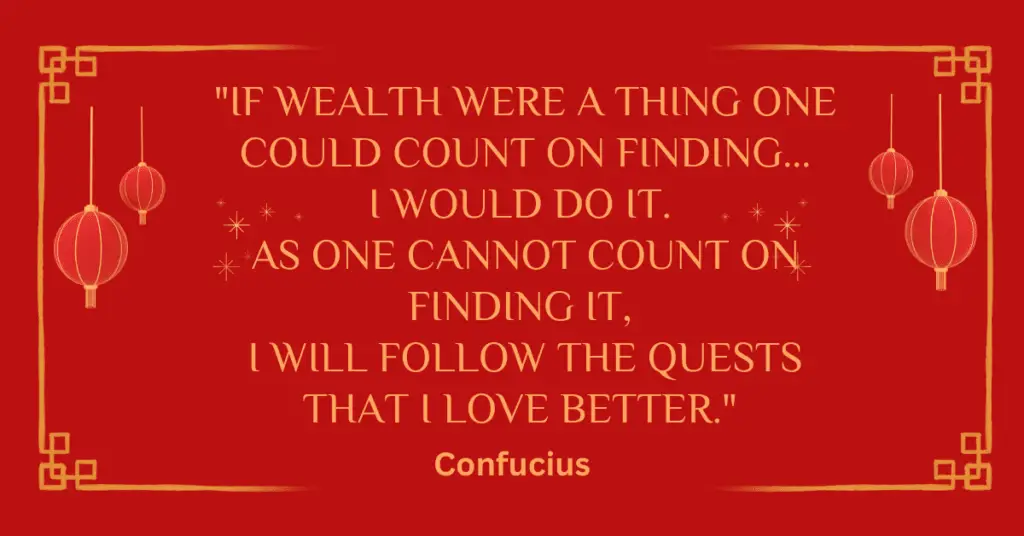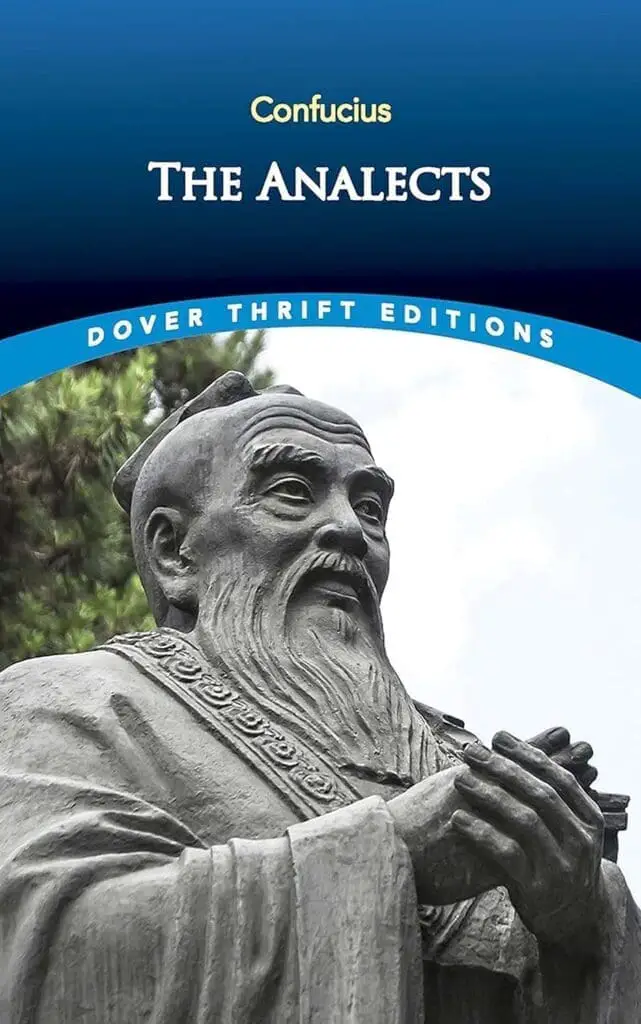Confucius Quotes
Confucius clearly had a lot to say.
Ironically, he didn’t write any of it down.
Thankfully, his disciples compiled his words of wisdom into The Analects during the centuries following his death, way back when in 479 B.C.E.
The Analects reveal the straightforward, sometimes lighthearted, wisdom of Confucius regarding the timeless human issues of attaining happiness, achieving true success, and discovering the meaning of life.
I hope you enjoy the 43 Confucius quotes below from The Analects. I’ve included the page numbers as well, with my original source being the Dover Thrift edition linked below.
This post may contain affiliate links. If you click them, I could earn a small commission at no cost to you. Thank you!
Confucius Quotes
43 Confucius Quotes from The Analects
Confucius Quotes
1. “In intercourse with friends have I been insincere? And have I failed to practise what I have been taught?” Pg. 20, The Analects of Confucius
2. “To conduct the government of a State of a thousand chariots there must be religious attention to business and good faith, economy in expenditure and love of the people, and their employment on public works at the proper seasons.” Pg. 20, The Analects of Confucius
3. “The scholar who in his food does not seek the gratification of his appetite, nor in his dwelling is solicitous of comfort, who is diligent in his work, and guarded in his speech, who associates with the high-principled, and thereby directs himself aright, — such a one may really be said to love learning.” Pg. 22, The Analects of Confucius
4. “At fifteen I set my mind upon wisdom. 2. At thirty I stood firm. 3. At forty I was free from doubts. 4. At fifty I understood the laws of Heaven. 5. At sixty my ear was docile. 6. At seventy I could follow the desires of my heart without transgressing the right.” Pg. 24, The Analects of Confucius
5. “He who keeps on reviewing his old and acquiring new knowledge may become a teacher of others.” Pg. 26, The Analects of Confucius
6. “Learning without thinking is useless. Thinking without learning is dangerous.” Pg. 27, The Analects of Confucius
7. “When a deed is done it is useless to discuss it, when a thing has taken its course it is useless to remonstrate, what is past and gone it is useless to blame.” Pg. 36, The Analects of Confucius
8. “A man without virtue cannot long abide in adversity, nor can he long abide in happiness; but the virtuous man is at rest in virtue, and the wise man covets it.” Pg. 38, The Analects of Confucius
9. “He who heard the truth in the morning might die content in the evening.” Pg. 39, The Analects of Confucius
10. “The student who aims at wisdom, and yet who is ashamed of shabby clothes and poor food, is not yet worthy to be discoursed with.” Pg. 39, The Analects of Confucius
11. “The wise man in his attitude towards the world has neither predilections nor prejudices. He is on the side of what is right.” Pg. 40, The Analects of Confucius
12. “The man of honour thinks of his character, the inferior man of his position. The man of honour desires justice, the inferior man favour.” Pg. 40, The Analects of Confucius
13. “One should not be concerned at lack of position, but should be concerned about what will fit him to occupy it. One should not be concerned at being unknown, but should seek to be worthy of being known.” Pg. 40, The Analects of Confucius
14. “The wise man is informed in what is right. The inferior man is informed in what will pay.” Pg. 41, The Analects of Confucius
15. “When you see a man of worth, think how to rise to his level. When you see an unworthy man, then look within and examine yourself.” Pg. 41, The Analects of Confucius
16. “The self-restrained seldom err.” Pg. 42, The Analects of Confucius
17. “The wise man desires to be slow to speak but quick to act.” Pg. 42, The Analects of Confucius
18. “The man who is always ready with his tongue to others will often be disliked by them.” Pg. 45, The Analects of Confucius
19. “Now my attitude towards others is to listen to what they say and note what they do.” Pg. 46, The Analects of Confucius
20. “He who is not strong enough,’ answered the Master, ‘gives up half way, but you are drawing the line already.” Pg. 53, The Analects of Confucius
21. “An altruist, even if some one said to him, “There is a man in the well,” would, I suppose, go in after him?’ ‘Why should he act like that?’ answered the Master. ‘The higher type of man might hasten to the well, but not precipitate himself into it; he might be imposed upon, but not utterly hoodwinked.” Pg. 56, The Analects of Confucius
22. “For the philanthropist is one who desiring to maintain himself sustains others, and desiring to develop himself develops others. 3. To be able from one’s own self to draw a parallel for the treatment of others, — that may be called the rule of philanthropy.” Pg. 57, The Analects of Confucius
23. “If wealth were a thing one could count on finding, even though it meant my becoming a whip-holding groom, I would do it. As one cannot count on finding it, I will follow the quests that I love better.” Pg. 61, The Analects of Confucius
Confucius Quotes

Confucius Quotes
24. “With coarse food to eat, water for drink, and a bent arm for a pillow, — even in such a state I could be happy, for wealth and honour obtained unworthily are to me as a fleeting cloud.” Pg. 61, The Analects of Confucius
25. “When walking in a party of three, my teachers are always present. I can select the good qualities of the one and copy them, and the unsatisfactory qualities of the other and correct them in myself.” Pg. 63, The Analects of Confucius
26. “Affecting to have when they have not, empty yet affecting to be full, in straits yet affecting to be prosperous, — how hard it is for such men to have constancy of purpose!” Pg. 63, The Analects of Confucius
27. “There are men, probably, who do things correctly without knowing the reason why, but I am not like that: I hear much, select the good and follow it; I see much and treasure it up. This is the next best thing to philosophical knowledge.” Pg. 64, The Analects of Confucius
28. “The noble man is calm and serene, the inferior man is continually worried and anxious.” Pg. 66, The Analects of Confucius
29. “The scholar must not be without capacity and fortitude, for his load is heavy and the road is long.” Pg. 69, The Analects of Confucius
30. “It is not easy to find a man who has studied for three years without aiming at pay.” Pg. 70, The Analects of Confucius
31. “Make conscientiousness and sincerity your leading principles. Have no friends inferior to yourself. And when in the wrong, do not hesitate to amend.” Pg. 78, The Analects of Confucius
32. “The enlightened are free from doubt, the virtuous from anxiety, and the brave from fear.” Pg. 79, The Analects of Confucius
33. “Not yet understanding life, how can you understand death?” Pg. 89, The Analects of Confucius
34. “I thought you were dead,’ he replied, ‘While you, Sir, live, how should I dare to die?” Pg. 92, The Analects of Confucius
35. “On searching within,’ replied the Master, ‘he finds no chronic ill, so why should he be anxious or why should he be afraid?” Pg. 96, The Analects of Confucius
36. “The essentials of government, the Master replied: ‘Sufficient food, sufficient forces, and the confidence of the people.” Pg. 97, The Analects of Confucius
37. “for from of old death has been the lot of all men, but a people without faith cannot stand.” Pg. 97, The Analects of Confucius
38. “I can try a lawsuit as well as other men, but surely the great thing is to bring about that there be no going to law.” Pg. 99, The Analects of Confucius
39. “A man may be able to recite the three hundred Odes, but if, when given a post in the administration, he proves to be without practical ability, or when sent anywhere on a mission, he is unable of himself to answer a question, although his knowledge is extensive, of what use is it?” Pg. 106, The Analects of Confucius
40. “3. The people having grown so numerous, what next should be done for them?’ asked Jan Yu. ‘Enrich them,’ was the reply. 4. ‘And when you have enriched them, what next should be done?’ he asked. ‘Educate them,’ was the answer.” Pg. 106, The Analects of Confucius
41. “Do not be in a hurry; do not be intent on minor advantages. When one is in a hurry, nothing is thorough; and when one is intent on minor advantages, nothing great is accomplished.” Pg. 108, The Analects of Confucius
42. “To lead an untrained people to war may be called throwing them away.” Pg. 111, The Analects of Confucius
43. “To err and not reform may indeed be called error.” Pg. 129, The Analects of Confucius
Confucius Quotes
Confucius Quotes
Confucius Quotes
Related Posts:
- 11 Eternal Quotes from The Rubáiyát of Omar Khayyám for more philosophical insight from the ancient world.
Confucius Quotes

